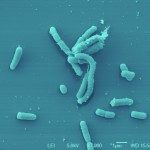Lien vers Pubmed [PMID] – 20176794
Lien DOI – 10.1128/IAI.01096-09
Infect Immun 2010 May; 78(5): 1979-89
The genome of the pathogenic bacterium Listeria monocytogenes contains a family of genes encoding proteins with a leucine-rich repeat domain. One of these genes, inlH, is a sigma(B)-dependent virulence gene of unknown function. Previously, inlH was proposed to be coexpressed with two adjacent internalin genes, inlG and inlE. Using tiling arrays, we showed that inlH expression is monocistronic and specifically induced in stationary phase as well as in the intestinal lumen of mice, independent of inlG and inlE expression. Consistent with inlH sigma(B)-dependent regulation, surface expression of the InlH protein is induced when bacteria are subjected to thermal, acidic, osmotic, or oxidative stress. Disruption of inlH increases the amount of the invasion protein InlA without changing inlA transcript level, suggesting that there is a link between inlH expression and inlA posttranscriptional regulation. However, in contrast to InlA, InlH does not contribute to bacterial invasion of cultured cells in vitro or of intestinal cells in vivo. Strikingly, the reduced virulence of inlH-deficient L. monocytogenes strains is accompanied by enhanced production of interleukin-6 (IL-6) in infected tissues during the systemic phase of murine listeriosis but not by enhanced production of any other inflammatory cytokine tested. Since InlH does not modulate IL-6 secretion in macrophages at least in vitro, it may play a role in other immune cells or contribute to a pathway that modulates survival or activation of IL-6-secreting cells. These results strongly suggest that InlH is a stress-induced surface protein that facilitates pathogen survival in tissues by tempering the inflammatory response.






